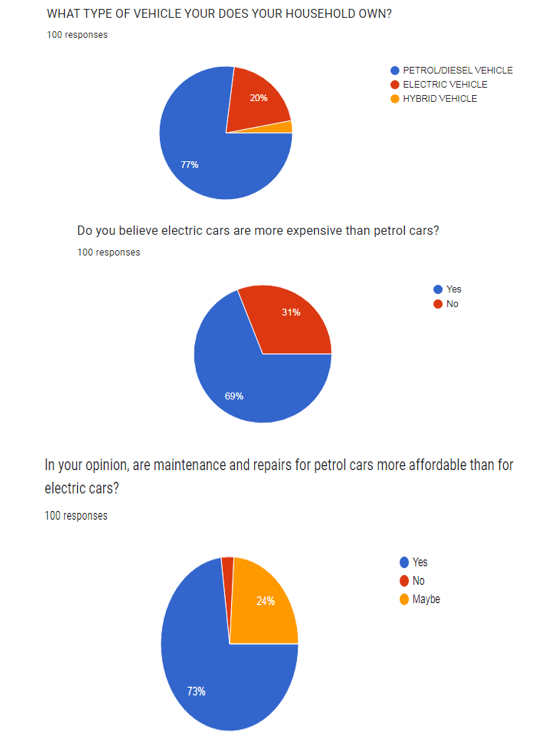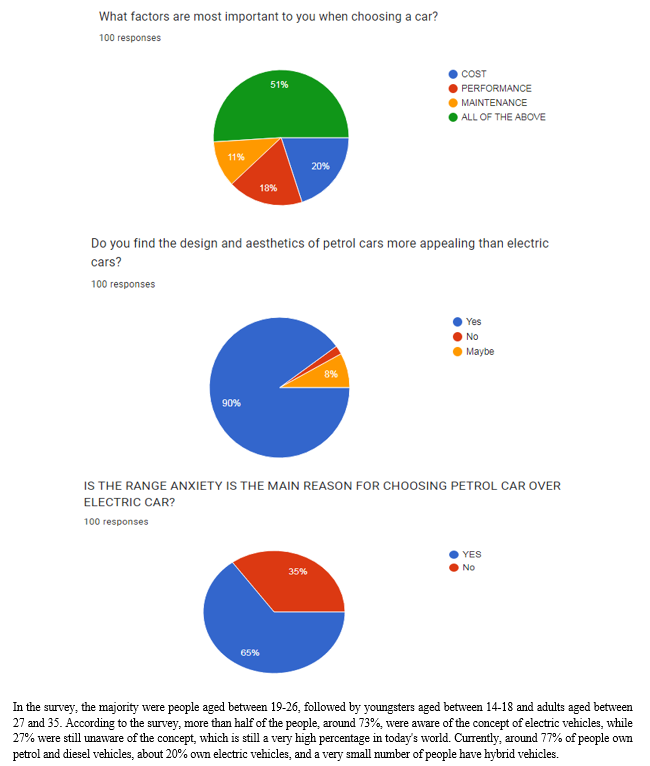Ijraset Journal For Research in Applied Science and Engineering Technology
- Home / Ijraset
- On This Page
- Abstract
- Introduction
- References
- Copyright
Why People Prefer Petrol Cars Over Electric Cars
Authors: Kausar Mohammed Asif Shaikh
DOI Link: https://doi.org/10.22214/ijraset.2024.57941
Certificate: View Certificate
Abstract
This research paper aims to explore and understand the reasons behind people\'s continued preference for petrol cars over electric cars. Despite the global push towards sustainable and environmentally friendly transportation, the adoption of electric cars remains relatively low compared to their petrol counterparts. Through a thorough examination of various factors including cost, infrastructure, range anxiety, performance, and environmental perceptions, this research paper examines the underlying reasons for this preference.
Introduction
I. INTRODUCTION
The automotive industry is currently experiencing a significant shift towards sustainable and environmentally friendly transportation options. Electric cars have emerged as a promising solution to reduce carbon emissions, combat climate change, and lessen our reliance on fossil fuels. However, despite the numerous advantages offered by electric vehicles (EVs), a considerable portion of the global population still prefers petrol cars over electric counterparts.
Understanding the reasons behind this consumer preference is critical to promoting the widespread adoption of electric cars and accelerating the transition to a greener transportation ecosystem. This research paper aims to explore the underlying factors influencing people's continued preference for petrol cars, unveiling potential barriers hindering the mass acceptance of electric cars.
A. Background
One of the prominent challenges hindering the widespread adoption of electric cars is the limited availability of charging infrastructure. Unlike petrol cars, which can be refueled at a gas station within a few minutes, electric cars require charging stations that are conveniently located and easily accessible. The lack of an extensive charging network can limit the feasibility and convenience associated with electric vehicle ownership, making petrol cars a more practical choice for many consumers.
Electric cars often face criticism regarding their limited driving range when compared to petrol vehicles. Concerns regarding "range anxiety" contribute to consumer hesitation in embracing electric cars, as they fear running out of battery power in the middle of a journey.
Despite the potential long-term cost savings of owning an electric car, the higher upfront costs of purchasing these vehicles often discourage consumers.This price disparity often outweighs the potential savings in fuel costs and leads consumers to choose the familiarity and affordability of petrol cars.
Although modern electric cars are increasingly offering competitive performance, there is still a perception among some consumers that petrol cars provide superior performance in terms of speed, acceleration, and overall driving experience. This perception, often grounded in traditional views of performance associated with petrol engines, can be a significant factor influencing consumer preference for petrol cars over electric alternatives.
Psychological and cultural factors: People's preference for petrol cars can also be attributed to psychological and cultural factors. The longstanding association of petrol cars with freedom, power, and autonomy creates an emotional attachment that is not as strong with electric vehicles, which are often viewed as more practical and environmentally responsible choices. Additionally, cultural norms, societal expectations, and the influence of peers can shape consumer preferences and contribute to the preference for petrol cars in many regions
objective of a research paper on why people prefer petrol cars over electric cars could involve studying the various factors that influence consumer behavior and decision-making in the automotive industry. The goal would be to identify and analyze the reasons behind the prevalent preference for traditional petrol-powered vehicles despite the increasing availability and advancements of electric cars.
B. Some Potential Research Objectives For Such A Study Could Include
- Investigating the role of familiarity and habit: Determine whether the preference for petrol cars is a result of long-standing familiarity and habit, and if so, examine the factors that contribute to the resistance to change.
- Assessing perceptions of performance and range anxiety: Explore how perceived performance limitations and concerns about range anxiety affect consumer preferences for petrol cars over electric vehicles.
- Analyzing the influence of cost and affordability: Understand the impact of vehicle costs, including purchase price, running costs, and upfront infrastructure investments, on the decision-making process of consumers.
- Examining societal and cultural factors: Investigate how societal norms, cultural perceptions, and anticipated societal infrastructure play a role in people's choice towards petrol cars compared to electric cars.
- Identifying concerns about charging infrastructure: Assess the significance of concerns surrounding charging infrastructure availability, accessibility, and convenience in the preference for petrol cars.
- Exploring environmental attitudes and awareness: Investigate the relationship between environmental attitudes, awareness, and the preference for petrol cars, specifically assessing whether misconceptions or lack of information about electric vehicles influence consumer choices.
- Evaluating psychological factors: Explore psychological factors, such as status symbols, self-identity, and perceived social acceptance , that may influence the preference for petrol cars and hinder the adoption of electric vehicles.
II. RESEARCH METHODOLOGY
The study is analytical in nature and find out factors influencing customers preference towards petrol and diesel cars over electric cars in the Mumbai district. Sample of 50 was well designed and taken to cover multiple aspects of objectives. 50 People with different age group were surveyed both petrol and diesel variants were rightly questioned and interviewed with views over the papers objective.



About 69% of people believe that electric vehicles are more expensive than normal conventional petrol vehicles.
Even though 31% of people believe that petrol cars are more expensive than electric vehicles, they still prefer petrol cars because of psychological factors.
From the survey, we can see that around 73% of people believe that the maintenance and repair of petrol cars are more affordable than electric vehicles, while around 24% are not sure.
According to a survey conducted, cost, performance, and maintenance are the most important factors when choosing a vehicle, with cost being the top factor, followed by performance and maintenance.
Generation Z, commonly known as genz, finds the design and aesthetics of petrol vehicles more appealing than electric vehicles, as we can see from the survey that about 95% of people find the aesthetic of petrol cars more attractive than electric cars.
From the survey, we found out that about 65% of people choose petrol cars over electric cars because of Range Anxiety, which means people are afraid that electric vehicles may shut down during long journeys. From the survey, we conclude that there are many factors that lead people to prefer petrol cars over electric cars.
III. COST FACTORS
A. Acquisition Cost
The cost of buying an EV is definitely higher than buying a petrol car in India. One of the major reasons for the price difference is the usage of battery packs. The technology used on these batteries is different from conventional batteries and they are designed to last for a long period of time as well
B. Maintenance Cost
Electric cars have far fewer moving parts and engine parts in general as compared to petrol cars. This not only makes them less complicated to service but also reduces the cost of maintenance. Though EVs are a bit expensive to buy upfront, the expenses that owners incur later are far fewer as compared to petrol cars. The yearly maintenance of an EV can be as low as 1/3rd or 1/4th of the cost of a petrol car for the same period. Thus, making them way more affordable to maintain. Also, the fewer parts in EVs mean that the need for replacing them due to wear and tear also greatly reduces. However, the cost of any repairs to the body of the car would remain the same.
C. Charging Infrastructure Cost
Establishing charging infrastructure, especially fast-charging stations, involves significant costs. Private and public entities may hesitate to invest in these installations without clear incentives or a guaranteed user base.
IV. INFRASTRUCTURE CHALLENGES:
A. Charging Station Availabilty
- Charging Infrastructure: Limited Charging Stations: In many regions, the number of charging stations is limited compared to the extensive network of traditional petrol stations. This limitation can lead to concerns about range anxiety among EV users.
- Charging Speeds: While charging technology has improved, fast-charging stations are not as widespread as standard chargers. This can result in longer waiting times for EV users who require a quick charge.
- Rural and Remote Areas: Infrastructure challenges are often more pronounced in rural and remote areas where the installation of charging stations may be economically unfeasible due to lower population density.
- Maintenance and Reliability: The reliability of charging stations can be a concern. Regular maintenance and swift resolution of issues are crucial to ensuring a positive EV ownership experience.
B. Charging Time And Cinvenience
- Charging Time,Charging Speed: Fast Charging: While fast-charging stations are available, the charging speed is still not as rapid as refueling a petrol vehicle. Long charging times, even with fast chargers, can be a barrier for users who are accustomed to quick refueling.
- Convenience Challenge
a. Charging Station Accessibility and Location: The placement of charging stations may not always align with user convenience. The accessibility of charging stations in urban areas, public spaces, and along travel routes is critical for user convenience.
b. Rural and Remote Areas: Infrastructure challenges are often more pronounced in rural and remote areas where the installation of charging stations may be economically unfeasible due to lower population density.
C. Battery Range Limitation
Battery Capacity and Limited Range: Electric vehicles often have limited driving ranges compared to petrol vehicles. As a result, frequent charging becomes necessary, especially during long journeys, contributing to longer overall travel times
D. Battery Degradation And Replacement
- Battery Degradation and Chemical Processes: Lithium-ion batteries, commonly used in electric vehicles, undergo chemical processes during charge and discharge cycles, leading to gradual degradation over time.High temperatures, as well as extreme cold, can accelerate battery degradation. Maintaining an optimal operating temperature is crucial for preserving battery health.
- Battery Replacement and Cost Considerations: Battery replacement can be a significant expense. Advances in technology are expected to bring down costs over time, but it remains a factor to consider in the overall cost of EV ownership.
V. RANGE ANXIETY
A. Perception Of Limited Driving Range
Range Anxiety: Many consumers worry about the limited driving range of electric vehicles compared to traditional petrol cars. This psychological barrier can affect the willingness of potential EV buyers to make the switch.
B. Psychological factors
The preference for petrol cars over electric cars can be influenced by various psychological factors. Understanding these factors is crucial for promoting the adoption of electric vehicles (EVs). Here are some psychological aspects that may contribute to people preferring petrol cars:
C. Familiarity and Habit and Psychological Inertia
People may be resistant to change due to psychological inertia. The familiarity and habit of driving petrol cars for generations can create a preference for what is known and comfortable.
Fear of Running Out of Charge is the main fear people have related to a electric car that it might stop during the
VI. PSYCHOLOGICAL BARRIERS TO NEW TECHNOLOGY
- Technology Adoption Curve: Electric vehicles represent a newer technology, and some individuals may be positioned at the later stages of the technology adoption curve. Resistance to new and unfamiliar technology can be a psychological barrier.
- Cultural and Social Norms:
a. Social Influence: Cultural norms and societal expectations can play a role in shaping preferences. If petrol cars are culturally ingrained as a status symbol or a preferred choice, individuals may conform to these social expectations.
b. Emotional Attachment: Emotional Connection to Petrol Cars: Some individuals may have emotional attachments to petrol cars, associating them with specific memories or experiences. Emotional connections can be powerful influencers in consumer choices.
c. Environmental Skepticism: Doubts About Environmental Impact: Some individuals may be skeptical about the actual environmental benefits of electric vehicles. Doubts about the sustainability of electricity sources or the overall environmental impact of manufacturing batteries can influence preferences.
VII. PERFORMANCE AND CONVIENIENCE
A. Acceleration And Power
Electric vehicles have strong acceleration ability in the early stage, poor acceleration ability in the later stage, and the maximum speed is not as high as that of fuel vehicles.
B. Long Distance Travel
Electric vehicles often have limited driving ranges compared to petrol vehicles. As a result, frequent charging becomes necessary, especially during long journeys, contributing to longer overall travel times
VIII. REASONS FOR PREFERRING PETROL CARS
A. Psychological and Emotional Factors
- Familiarity and comfort with conventional cars
- Perception of electric cars as unexciting or lacking in performance
- Concerns over limited EV range and charging infrastructure
B. Cost and Financial Considerations
- Initial purchase price and perceived high cost of electric vehicles
- Uncertainty surrounding long-term reliability and maintenance expenses
- Existing infrastructure investments (petrol stations, repair shops, etc.)
C. Technological Limitations
- Battery limitations (charging time, availability of charging stations)
- Limited model options with specific features or configurations
- Lack of trust in emerging technologies and fear of being an early adopter

In above table we can see that the data of sales of conventional and electric vehicles in India of 2018, in which cars are the least sell electric vehicle followed two wheelers while 3 wheelers electric vehicle is the largest sale vehicle among electric vehicles.
References
[1] R Journal of Physics: Conference Series Youjun Bai and Yan Zheng 2020 [2] https://www.godigit.com/motor-insurance/car-insurance/find/electric-car-vs-petrol-car [3] https://www.tatacapital.com/blog/personal-use-loan/electric-cars-vs-petrol-cars-pros-cons/ [4] Beck, M. J., Fifer, S., & Rose, J. M. (2016). Can you ever be certain? Reducing hypothetical bias in stated choice experiments via respondent reported choice certainty. Transportation Research Part B: [5] Doran, R., & Larsen, S. (2016). The relative importance of social and personal norms in explaining intentions to choose eco-friendly travel options. International Journal of Tourism Research
Copyright
Copyright © 2024 Kausar Mohammed Asif Shaikh. This is an open access article distributed under the Creative Commons Attribution License, which permits unrestricted use, distribution, and reproduction in any medium, provided the original work is properly cited.

Download Paper
Paper Id : IJRASET57941
Publish Date : 2024-01-08
ISSN : 2321-9653
Publisher Name : IJRASET
DOI Link : Click Here
 Submit Paper Online
Submit Paper Online

